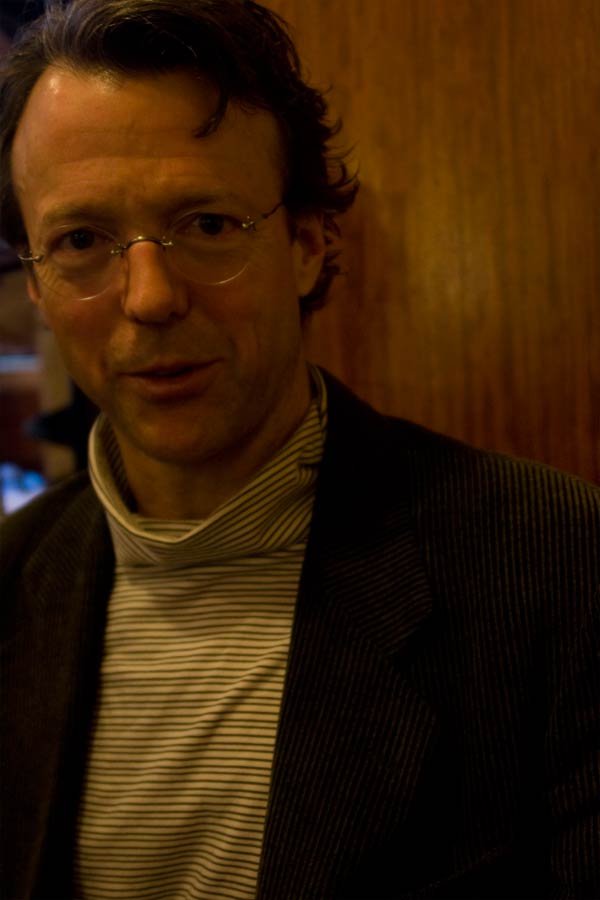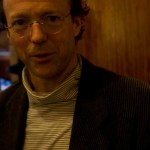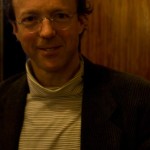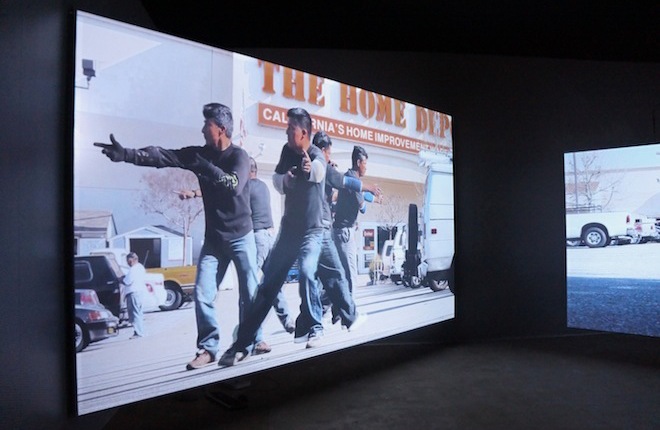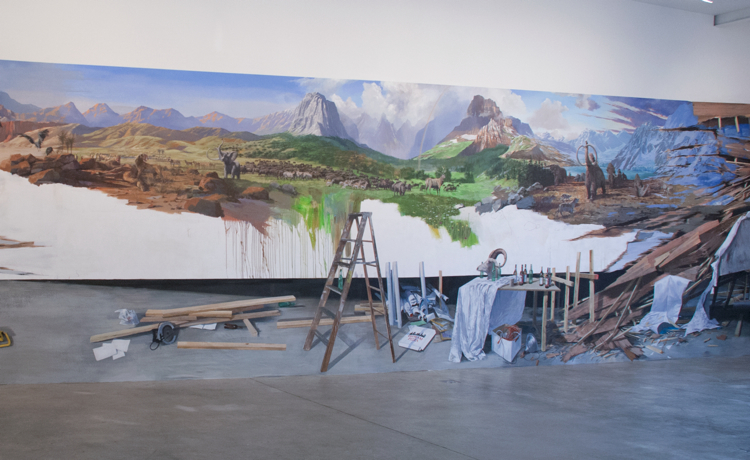By CHRISTIAN HOLLAND
To the opening for the art exhibition, Experiencing the War in Iraq, Jeff Carpenter wore a slimly tailored black corduroy blazer over a casual button down shirt with slacks, but just five days previous, in the gallery-cum-recording studio called Machines with Magnets in Pawtucket, Rhode Island, where most of the works in Experiencing are exhibited, he was barely recognizable through the opening of a faux-fur trimmed hood of a heavy, navy-blue parka.
Sticking out from under the chunky hood was the brim of a black FAIR (Fairness and Accuracy in Reporting) baseball cap that pressed down Jeff’s wavy, but typically neatly-combed, straw-colored hair. He was glassy-eyed and clumsy from a fever. When he poured himself a small plastic cup-full of his homemade ginger tea, which resembled apple cider in color and consistency, he almost missed the cup and overfilled it enough for the opaque, brown liquid to run onto the floor.
He had stopped in to the gallery to devote his remaining 15 minutes-worth of energy to a conversation with his co-curators, the artists Erin Rosenthal, Leif Goldberg and Raphael Lyon, about the floor design of exhibiting artist Rebecca Heyl’s installation, “Collateral Damage.” It was a short walking maze comprised of walls made of suspended muslin sheets, each with hundreds of black ribbons and the occasional American flag ribbon pinned them in a grid formation. A quintessential piece in the show, it symbolized the ratio of Iraqi to American war dead, and needed to be accessible for any of the guests to the gallery who use a wheelchair.
For the last five years of his life, Jeff, 54, a painter and photographer, has devoted his nights and weekends to activism that supports the artistic community of Rhode Island and South Eastern Massachusetts. “He has been doing absolutely amazing things in Fall River” said Kathy Bitetti, Executive Director of the Artists Foundation, an artist support organization in Boston, where Jeff also sits on the advisory board. Over the phone, Bitetti added, “Jeff is actually a good artist. A lot of organizers aren’t good artists.”
“Kathy is my fairy godmother,” Jeff said in an interview at a coffee shop on Newbury Street in Boston around the corner from his girlfriend’s apartment on a Sunday morning in February. He had sought Bitetti’s help when he first began building Arts United|Fall River, an organization similar to the Artist Foundation, but which focuses on Fall River, where Jeff lives and has a studio.
When Jeff moved to Fall River from New York City in February of 2003in search of a better environment for artists with his now ex-wife, a jewelry maker, he became involved with the town’s Preservation Society. According to Jeff, the Society did not plan to take a stand on a planned condo tower on the Fall River water front, so he formed his own organization, Save Our Neighborhoods, and soon Alfred Lima, the president of the Greater Fall River Land Conservancy, and several others joined him. They prevented the tower’s construction, but Jeff says the most outlandish proposal was for a 100,000-square-foot discount auto parts store to replace a Victorian mansion in a residential neighborhood. Fall River has one of the largest unprotected collections of Victorian homes in the United States. In what he calls “an Erin Brockovitch moment,” Jeff brought the Fall River Zoning Board of Appeals rules with him to a meeting on the rezoning of the neighborhood and read them aloud to prevent the chicanerous developer from pursuing an attritive series of meetings meant to exhaust the public’s sense of disapproval.
In 2007, Jeff took his activism into Fall River’s electoral politics. “After 12 years of running the show like his own fiefdom,” Jeff said, “the Mayor had stepped down.” In the open seat, Jeff saw an opportunity to change the public debate, or lack thereof. He instigated the creation of Speak Up Fall River, a citizens forum on the candidates and popular issues, in response to incumbent City Councilors’ deliberate squelching of political dialogue during election seasons. This process entailed Jeff’s tracking down and consistent pestering of several candidates in order to get answers on topics the public wanted discussed. “Gus Suneson, a city council candidate, answered each question with 1-5 words,” Jeff said, “like ‘Will Discuss this Issue!’ ‘Will look at all options!’ ‘You can Count on it!’ ‘Will scrutinize.’ and ‘No Promises.’”
An accomplishment of Jeff’s activism was the creation of the Arts Overlay District, an area where arts oriented businesses and organizations can establish themselves with lower tax burdens. Cathy Ann Viveiros, one of the newly elected City Councilors who had met Jeff at an election related forum, lauded his skills at an orator but also as a politician. “He knows how not for profits and government can work together,” she said over the phone from her the office of her consulting business in Fall River, “and he has an astute understanding of that relationship.”
In the city where the motto is “We’ll try,” Jeff struggled to give the public the sense that the arts could be part of their quest for change in their quality of life. “People thought that culture doesn’t happen here,” said Jeff about Fall River.
According to Councilor Vivieros, who had repeatedly seen Jeff at public forums and hearings, he worked hard to educate the community about the economic benefits of the arts. “Jeff is very very valuable to the community and we’re lucky to have him,” she said.
As a landscape painter and photographer, Jeff admits that serious political issues have evaded his methodology and personal style. “[The paintings] are about moments in life that touch your soul,” Jeff said. “How could you reconcile the two?” he continued, “And I hadn’t. So there was this disconnect, but then last June, Liam Madden came to speak in Providence.”
Madden, a Northeastern University student and the 22-year-old founder of Iraq Veteran’s Against the War, “sends a shiver through an audience of 20,000 when he speaks,” Jeff said, and two close friends of Jeff had the opportunity to meet him. Madden expressed concern over the demographic he was able to reach with his speeches, as his audiences were typically over 50, and suggested invigorating the limited dialogue young Americans were having about the Iraq War with Art and Music. Jeff’s response to Madden’s suggestion was to attempt to create an art show that incorporated work from soldiers and veterans from the Iraq War along with traditional artists working in the United States.
The show, Experiencing the War in Iraq, opened on March 7, after eight months of preparation, and many 100+-hour work weeks from Jeff, includes 67 works from 600 nationa and international entrants who responded to the show’s open call. Along with Rebecca Heyl, several anonymous artists are in the show with images from the front lines of the war, while Wafaa Billal, an Iraqi artist who was imprisoned by the Hussein regime and now teaches at the Art Institute of Chicago, is also represented.
Jeff sought the help of the Providence based artist Leif Goldberg to help organize and curate the show and add a much needed draw for younger adults. Jeff had happened upon Goldberg in the 2002 Whitney Biennial, which he participated in as a component of the art and music collaborative Forcefield. The route Jeff took to find Goldberg was circuitous – as a fellow RISD alum, Jeff called Goldberg’s phone number in the alumnae directory, which happened to be Goldberg’s mother’s number – but with Goldberg came Erin Rosenthal and Raphael Lyon, each of whom were artists about 20 years younger than Jeff with connections to the Providence music scene. The opening for the show included a performance by the local bands Black Pus, Baba Yaba, and Riders Against the Storm.
It was difficult to find Jeff without an audience on that evening. Heyl said during the installation that she felt like “Jeff was the spokesperson for the show,” and the local NBC affiliate had sought him out when they stopped by for an on-camera interview, the questions for which he answered without resting his polite smile. He stood with an almost boarding school posture, but spoke slowly and comfortably. Jeff is tall enough to have been one of the tallest people in the gallery that night and with his rimless glasses and blazer, he captured the patrician air of a professor.
Jeff recounted the last period of his life where he engaged in as rigorously in civic activity as his freshman year at RISD at the Experiencing opening. He had been an anarchist in high-school—his response to the Vietnam War—but, “for some reason, when I started art school, I saw all sorts of new potential,” he said. He was elected to student government and established a school newspaper all of which he wrote and laid out himself.
“This is a relapse.” Jeff said, but then immediately offered an elaboration before he rushed off to freshen up for his interview: “To see potential wasted in a community, it’s my Achilles heel.”
After Jeff graduated from RISD, his animated short, “Rapid Eye Movements” screened at festivals around the United States and Europe, and he moved to Hollywood and started a production company, where he eventually made 365 commercials before later becoming a full-time painter. Though he was politically liberal, he was less active than his sisters, Mary and Katie. Mary, who is the eldest sister and the family, is a journalist and leads an organization in Washington called MOB (Mothers Opposed to Bush). “She was a real hippie and protested the Vietnam War and was the first person I knew to take stands that were controversial,” said Katie, a documentary producer with an environmental bent whose recent credits include A Year on Earth (2007), which was broadcast on the Discovery Channel and nominated for an Emmy.
“[Public service] never really took the form of activism until [our]generation,” said Katie. Their father, Edmund N. Carpenter II, a two-time Deputy Attorney General of Delaware with two Honorary Doctorates, placed a great deal of emphasis on public service, but Katie adds, “I don’t think I'm in anyone's footsteps, and I know Jeff isn't. The larger question might be why the kids of a corporate lawyer and a housewife ended up in the arts and media . [It’s] probably part of some revolutionary-reactionary cycle of history that I poorly understand.” Edmund, according to the Federal Election Commission, gave the maximum donation allowable by law to Rudolph Giuliani and Mitt Romney’s campaigns and that’s just the tip of the iceberg. “We are not doing what our parents probably wanted or even predicted,” Katie said.
It was Jeff’s girlfriend, Shelly Lamborn’s, birthday on the Sunday of his interview in Boston and he had taken an hour out of her day for it. His interview was, however, interrupted once by a call regarding a small event he had planned for Lamborn later that day.
Lamborn had met Jeff when she was 24 years old on Fishers Island, New York where both of their families have homes. They went through a brief romance but didn’t reconnect, and only by chance, until 19 years later in Boston, long after Jeff had been married. However, Jeff was not to be married for much longer, and last fall he contacted Lamborn and asked her to go see the play Simon Says at the Boston Center for the Arts’ Black Box Theatre.
Fishers Island was a vacation spot for Lamborn, but it Jeff had spent two consecutive winters on the island at a time when its population drops from a weekend high of 2000 down to 289 people. “He was a lot more of the tortured artist back then,” Lamborn said. She was initially attracted to the Lizard print sport jacket that he had worn to a local watering hole where they met.
Regarding Jeff’s schedule, Lamborn said over the phone that Jeff refers to the times they get to see each other as “stolen moments,” but said later, “What I find attractive about him is his desire to give back. I admire him. And he’s handsome.”

